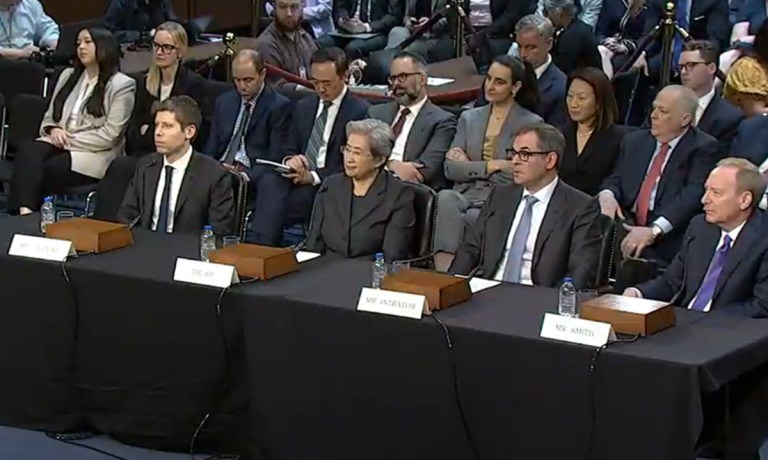Tech Leaders Urge Congress for ‘Light-Touch’ AI Regulations

Top executives from OpenAI, Microsoft, AMD and CoreWeave urged lawmakers at a U.S. Senate hearing Thursday (May 8) to support the nation’s artificial intelligence efforts through “light-touch” regulations.
“The stakes could not be higher — and Congress is right that the United States must lead the way,” OpenAI CEO Sam Altman said before the Senate Committee on Commerce, Science and Transportation in Washington, D.C.
The hearing, “Winning the AI Race: Strengthening U.S. Capabilities in Computing and Innovation,” revealed the companies’ common priorities to accelerate infrastructure investment; build a skilled AI workforce, including high-skilled immigration; and speed up permitting for power plants.
In a largely chummy hearing — at one point a senator informally called Altman “Sam” instead of “Mr. Altman” — lawmakers asked the executives what the government can do to stay ahead in AI and keep China at bay.
Altman said a “light-touch regulatory framework,” initiatives to support AI infrastructure and supply chains, the easing of the permitting process and getting more energy online are things the tech sector needs.
“We’ll need your help,” Altman told Republican Sen. Dan Sullivan of Alaska, who made a pitch for AI data center investments in his state.
Microsoft President Brad Smith said clarifying rules around data used for training would be helpful. There have been several lawsuits over copyrighted material being used for AI training without compensation to the creators.
Smith gave the example of Shakespeare’s literary works. People read Shakespeare and are inspired by the Bard to create their own content. Such content should be “fair use” for AI model training.
Read also: AI Regulations in States Shift to Pro-Innovation, Not Risk Mitigation
China Under the Microscope
Throughout the hearing, a recurring concern among senators was China gaining on the U.S. in the AI race and the implications that would have on geopolitics.
Altman said the future can be “almost unimaginably bright, but only if we take concrete steps to ensure that an American-led version of AI, built on democratic values like freedom and transparency, prevails over an authoritarian one.”
Lisa Su, CEO of chipmaker AMD, warned that “leadership is not guaranteed.”
For example, Su said chip export controls that affect AMD and its rivals may slow AI development in adversarial nations, but people will make do with what they have and still advance in AI.
The President Joe Biden administration restricted advanced chip AI exports primarily to China to slow that nation’s AI development. The President Donald Trump administration is revisiting those rules, delaying implementation, Reuters reported.
Microsoft’s Smith said exports must be regulated with the right controls because if allied countries cannot get American technology, they will get it elsewhere.
The “No. 1 factor” in determining which country leads in AI is “whose technology is more broadly adopted by the rest of the world,” Smith said.
Su agreed.
“If our international partners cannot access U.S. platforms, they will adopt alternatives that may be less advanced today but will mature over time,” she said.
Michael Intrator, CEO of cloud GPU provider CoreWeave, said poorly crafted restrictions could “inadvertently bolster foreign competitors.” He called for rules that foster international cooperation rather than fragmenting the global AI market.
“AI represents the next major evolution of technology with the potential to transform society,” Intrator said. “This is America’s AI moment, and a strategic opportunity America cannot afford to miss.”
See also: AI Regulations: OpenAI Calls on EU to Review, Simplify AI Rules
Powering the AI Economy
Each executive stressed that massive computing power is the bedrock of AI progress — and the U.S. must expand its data center capacity, power grid and chip supply.
“AI computation is energy-intensive,” Intrator said, citing U.S. Department of Energy forecasts that data centers could consume up to 12% of the nation’s electricity by 2028. “Every month of delay represents lost ground in a field where the pace of innovation is measured in weeks, not years.”
Smith said Microsoft is investing over $80 billion this year in AI infrastructure, with more than half going to U.S. projects.
“Just as you can’t have reliable electricity in your home without a powerplant, you can’t have AI without data centers and AI infrastructure,” he said.
All four executives said the talent gap could become a major chokepoint for U.S. competitiveness.
Altman said OpenAI’s models are already helping students and educators in states like Texas and North Carolina, with one-third of college-aged users in the U.S. relying on ChatGPT for tutoring and learning.
“AI will be vitally important to ensuring that today’s students are ready for tomorrow’s jobs,” he said.
Smith called for a national goal to make AI literacy accessible to all Americans, especially through partnerships with K-12 schools, community colleges and trade programs.
“Perhaps the single biggest challenge for data center expansion in the United States is a national shortage of people,” Smith said. “Over the next decade, the U.S. will need to recruit and train half a million new electricians to meet the country’s growing electricity needs.”
For all PYMNTS AI coverage, subscribe to the daily AI Newsletter.



